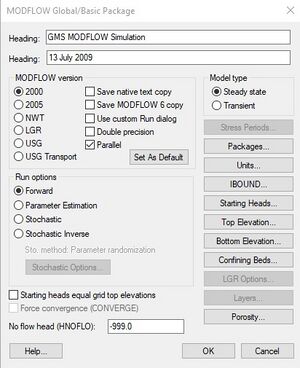GMS:MODFLOW-USG
| MODFLOW | |
|---|---|
| Pre-processing | |
| MODFLOW Commands | |
| Building a MODFLOW Model | |
| Map to MODFLOW | |
| Calibration | |
| Packages Supported in GMS | |
| Saving a MODFLOW Simulation | |
| Importing MODFLOW Files | |
| Unsupported MODFLOW Features | |
| Run MODFLOW | |
| Post-processing | |
| MODFLOW Display Options | |
| MODFLOW Post-Processing Viewing Options | |
| Reading a MODFLOW Simulation | |
| Tutorials | |
| Packages | |
| Flow: | BCF6, HUF, LPF, UPW |
| Solvers: | SMS |
| Other: | UZF1 |
Starting at GMS version 10.0, GMS supports MODFLOW-USG. MODFLOW-USG is a version of MODFLOW based on finite volume calculations, thus allowing for many different types of grid cells. This allows the model grid to more accurately match the model domain and be more efficiently refined in areas where more accuracy is desired.
MODFLOW-USG models are built using unstructured grids, or UGrids, which are a new (as of GMS 10.0) type of geometric object that can handle the wide variety of cell types supported by MODFLOW-USG.
The MODFLOW-USG model is included with all paid editions of GMS.
Contents
Choosing MODFLOW Version
Only MODFLOW-USG is supported when using unstructured grids. MODFLOW-USG can also be used for a model using a 3D grid. Choosing to use MODFLOW-USG is done in the MODFLOW Global/Basic Package dialog. With a 3D grid at any time the user can switch from one MODFLOW version to another.
Unsupported Features
Previous to GMS 10.1 there was no support for the following MODFLOW-USG features, though the CLN and GNC packages and the import feature are now supported in current versions of GMS.
- Packages/processes
- CLN Process
- GNC Package
- Older versions of GMS cannot read MODFLOW-USG files written by any non-GMS software. This is because there was no standard way to define the unstructured grid geometry. GMS writes a *.VTU (Visualization Toolkit unstructured grid) file with the MODFLOW files to define the grid geometry. In GMS 10.1 and later versions a model that was created outside of GMS can be imported as long as there is either a *.vtu file (VTK unstructured grid file) or a *.gsf file (Grid Specification File) present to define the grid geometry because the MODFLOW-USG native input files do not include locations of the grid nodes (unfortunately).
Additionally, PEST-ASP is currently unsupported in MODFLOW-USG
MODFLOW-USG Files
Here are tables of some of the available input and output files for MODFLOW-USG.
- For more information on these files see the manual
| Name | Description |
|---|---|
| MFN | MODFLOW Name File |
| GLO | Global Listing File |
| DIS | Discretization File |
| OC | Process Output Control Option File |
| BA6 | Basic Package Global Options File |
| Name | Description |
|---|---|
| SMS | Sparse Matrix Solver |
| Name | Description |
|---|---|
| BCF | Block-Centered Flow |
| LPF | Layer Property Flow |
| Name | Description |
|---|---|
| CHD | Time-Variant Specified-Head |
| DRN | Drain |
| EVT | Evapotranspiration |
| GAG | Gage |
| GHB | General Head Boundary |
| GNC | Ghost Node Correction |
| HFB | Horizontal Flow Barrier |
| LAK | Lake |
| RCH | Recharge |
| RIV | River |
| SFR | Streamflow-Routing |
| STR | Stream-Routing |
| SUB | Subsidence |
| WEL | Process Well |
| Name | Description |
|---|---|
| OBS | Main Observation Process Input |
| DROB | Drain Observation |
| CHOB | Constant-Head Flow Observation Input |
| Name | Description |
|---|---|
| MFS | MODFLOW Super File |
| MFW | GMS MODFLOW World File |
| MFR | GMS MODFLOW Result Index File |
| PRJ | Projection |
| CSV | Cell Summary Comma Separated Value Excel |
| HFF | Head and Flow File Link to MT3DMS |
| H5 | Hierarchal Data Format (HDF5) Array & List Data |
| M2P | MODFLOW Pest |
| PARAM | Parameter Information |
| Name | Description |
|---|---|
| CCF | Cell-to-Cell Aquifer Flow |
| CCF2 | Cell-to-Cell Stream Reach Outflow |
| DRW | Drawdown |
| GLO | Global Listing |
| HED | Head Output |
| OUT | Output |
| VTU | Visualization Toolkit Unstructured Grid |
| Name | Description |
|---|---|
| _W | Weighted Residuals |
| _WW | Weighted Equivalents & Weighted Observation |
| _WS | Weighted Residuals and Simulated Equivalents |
| _R | Unweighted Residuals |
| _OS | Observed Values and Simulated Equivalents |
| _B | Data Exchange File |
| _NM | Weighted Residuals and Probability Plotting |
Practical Notes
When using MODFLOW-USG to re-wet cells:
- In the MODFLOW SMS Solver dialog, the Nonlinear solution method should be set to one of the two Newton methods.
- In the LPF Package dialog, each layer should be set to Convertible Upstream (this is essentially a Newton layer).
External Files
See also
| GMS – Groundwater Modeling System | ||
|---|---|---|
| Modules: | 2D Grid • 2D Mesh • 2D Scatter Point • 3D Grid • 3D Mesh • 3D Scatter Point • Boreholes • GIS • Map • Solid • TINs • UGrids | |
| Models: | FEFLOW • FEMWATER • HydroGeoSphere • MODAEM • MODFLOW • MODPATH • mod-PATH3DU • MT3DMS • MT3D-USGS • PEST • PHT3D • RT3D • SEAM3D • SEAWAT • SEEP2D • T-PROGS • ZONEBUDGET | |
| Aquaveo | ||
